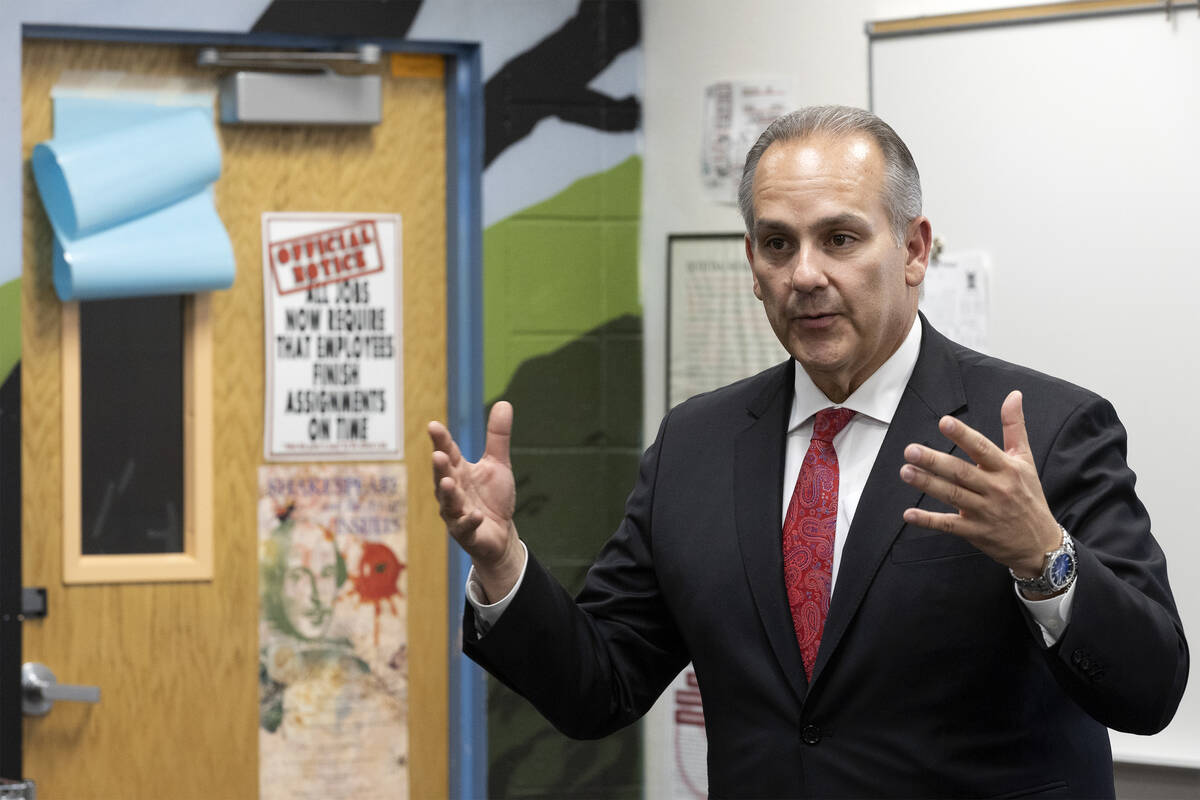Lower testing scores for 4th, 8th graders at CCSD show pandemic’s profound impact
The Clark County School District saw scores drop this year on a national standardized test compared with pre-pandemic scores, but eighth grade reading results held steady.
The nation’s fifth-largest district, which has more than 300,000 students, performed similarly to other large urban districts.
Scores on the National Assessment of Educational Progress — also called The Nation’s Report Card — were released Monday by the U.S. Department of Education’s National Center for Education Statistics.
They provide insight into how student achievement in fourth and eighth grades was affected by the COVID-19 pandemic. Average scores nationwide dropped in reading and math compared with 2019.
“The results show the profound toll on student learning during the pandemic, as the size and scope of the declines are the largest ever in mathematics,” National Center for Education Statistics Commissioner Peggy Carr said in a news release.
This year, tests were given to “representative samples” of fourth and eighth graders between January and March. In Nevada, about 9,375 students from 182 schools were chosen to participate.
Clark County results
In addition to state data, numbers were released Monday for 26 large urban school districts — including the Clark County School District — through the national assessment’s Trial Urban District Assessment program.
Eighth grade reading scores held steady in the majority — 21 — of participating urban districts, including Clark County.
It was the third time the school district participated in the urban assessment program, which allows for comparisons with districts that “serve similar student populations,” it said in a Monday news release.
The percentage of Clark County School District students who tested at “basic” or above on the National Assessment of Educational Progress were: 54 percent in fourth grade reading, 65 percent in fourth grade math, 65 percent in eighth grade reading and 54 percent in eighth grade math.
Students who test at a basic achievement level demonstrate a “partial mastery of prerequisite knowledge and skills that are fundamental for proficient work,” according to a Nevada Department of Education news release.
Meanwhile, students performing at a proficient level “demonstrate solid academic performance and competency over challenging subject matter,” the state said.
In fourth grade reading, 24 percent of Clark County School District test takers were at the “proficient” level or above — down from 30 percent in 2019.
Among fourth graders in math, 24 percent were proficient or above — down from 33 percent in 2019.
For eighth graders, 27 percent were proficient or higher in reading — the same as 2019. In math, 19 percent were proficient or higher — down from 24 percent in 2019.
“With this year’s NAEP data, we see some encouraging results; however, the reality is these numbers serve as a roadmap for the investments we need to make with the remaining COVID funding,” Superintendent Jesus Jara said in a news release. “These results also show the herculean work of CCSD teachers, administrators, and support professionals in tackling the challenges of the pandemic to minimize the impact on students.”
The school district’s students performed “as well as or better than their peers in large city schools nationally,” Council of the Great City Schools Executive Director Ray Hart said in a news release. The council is a membership organization for large urban school districts, including Clark County.
“Their students have already returned to the same performance levels observed prior to the pandemic in eighth-grade reading,” Hart said about the Clark County School District. “Sustaining achievement in any grade or subject in the face of a global crisis is no easy feat and is a testament to Clark County’s efforts to help their students recover from the impact of the global pandemic.”
The district said it has already made significant investments using federal coronavirus relief money for programs aimed at academic recovery, including providing all students with free online tutoring and for summer learning programs.
It also has allocated $60 million for purchasing English language arts instructional materials for kindergarten through 12th grades once the state adopts new materials.
Nevada results
Nevada’s average scores on the national assessment were lower than the nationwide average. The exception: eighth grade reading, where the state posted the same score as the nationwide average.
Eighth grade reading scores stayed consistent compared to 2019, while math scores dropped five points. Fourth graders saw a drop of 7 points in math and 6 points in reading.
The Nevada Department of Education said in a Monday news release that the state’s results were “in line with the national trend.”
“Students faced immense challenges over the last three years with an unprecedented pandemic that interrupted every aspect of our daily lives,” State Superintendent of Public Instruction Jhone Ebert said in the release. “I am encouraged to see eighth graders maintained their progress in reading and that is attributed to their resilience during the pandemic and the commitment of our educators. What matters most is what we do next.”
Candidates react
Gov. Steve Sisolak, locked in a tight re-election battle with Clark County Sheriff Joe Lombardo, defended his record on school spending in a statement from his campaign.
“During his first term, Governor Sisolak took unprecedented steps to support Nevada students, teachers and parents by funding schools at their highest levels ever, giving teachers their first raise in over a decade, allocating over $200 million to get our students caught up from the pandemic and brokering a historic compromise to direct $500 million towards our education system,” said Reeves Oyster, in a statement. “While Joe Lombardo wants to strip up to $300 million from our schools, put guns in the classroom and said ‘I don’t know’ when asked if teachers were underpaid on the campaign trail, Governor Sisolak is committed to building on his first term investments to ensure every child — no matter their zip code — has an equal opportunity at success by lowering classroom sizes, giving teachers another raise and continuing to make unprecedented investments in our schools.”
But Lombardo blamed Sisolak for the flagging numbers in a statement released by his campaign.
“The data is clear: our students are paying the price of Steve Sisolak’s disastrous decisions during COVID,” Lombardo said in the statement. “Our schools are unsafe and our students are failing to meet basic academic benchmarks. As governor, I’m ready to restore accountability and empowerment in our education system, so that we can give our students a brighter and better future.”
Contact Julie Wootton-Greener at jgreener@reviewjournal.com or 702-387-2921. Follow @julieswootton on Twitter.






































